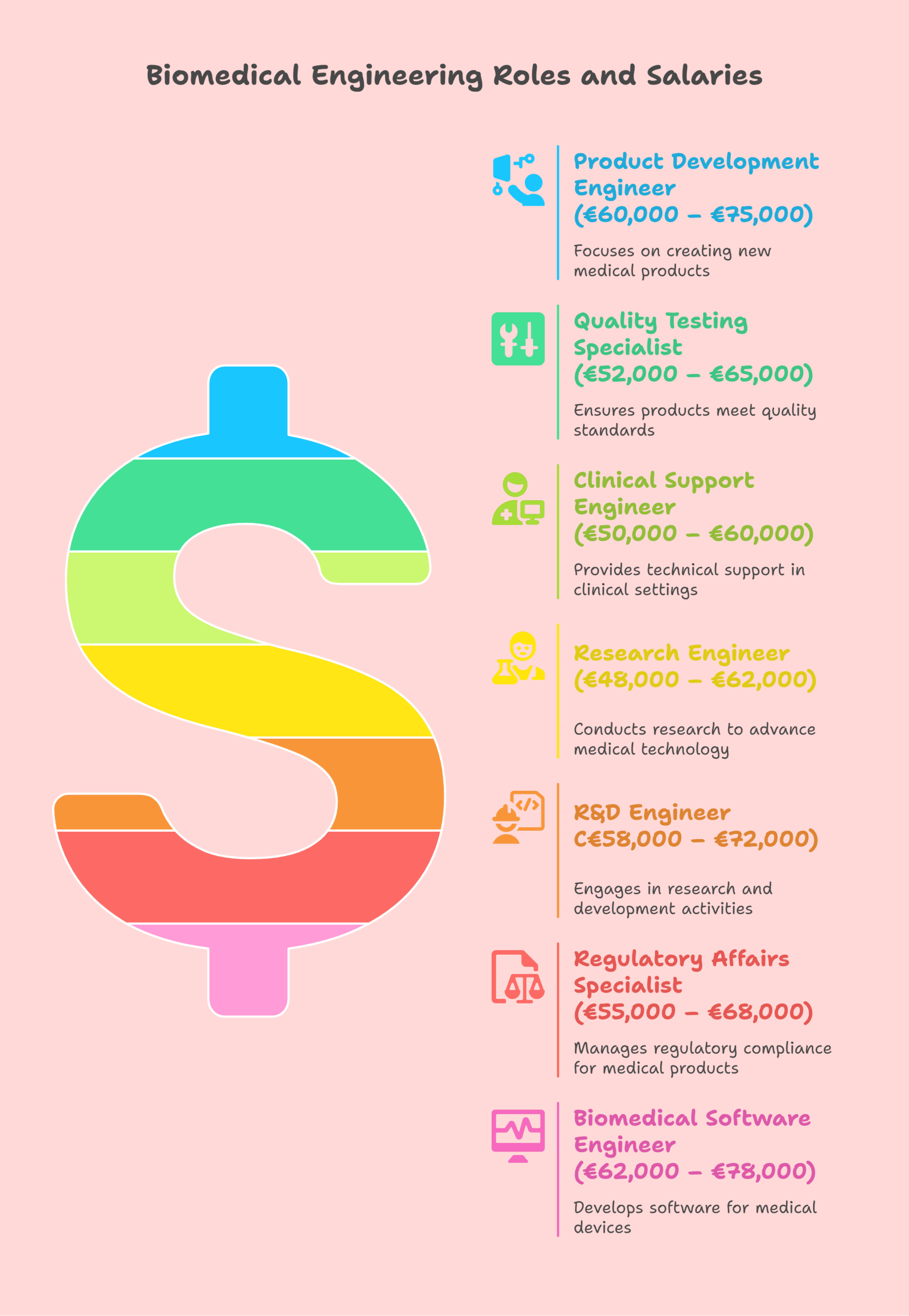Table of Contents
Germany is known for its strong healthcare system. It also leads in medical technology and research. Biomedical engineer salary in Germany attracts global attention today. Many students and professionals are exploring this career path. They want to know the pay and future scope. Germany offers great opportunities in biomedical engineering roles. This field combines healthcare, design, and innovation. If you love science and helping people, it fits you. Let’s explore how much you can earn here.
Understanding salary helps in making smart career decisions. It shows what to expect at different stages. It also depends on where you work. Big cities often pay more than smaller ones. Your skills and experience level also matter. Specialized roles usually offer higher starting pay. Language skills can also boost your chances. This blog breaks down everything you need. Let’s dive into the numbers and trends.
Master the German Language with Entri App! Click Here for Free Trial Class!
Biomedical Engineer Salary in Germany: Introduction
Germany’s biomedical sector is growing faster than ever before. New hospitals, labs, and companies are opening across the country. This growth means more jobs and better pay for engineers. Biomedical engineer salary in Germany is now a hot topic. On average, they earn €60,000 per year (gross). This blog explains everything about salaries in this field. From experience to city-wise pay, we cover it all.
What Does a Biomedical Engineer Do?
-
Combines biology, medicine, and engineering.
-
Designs and improves medical tools and devices.
-
Works on imaging systems, prosthetics, and lab equipment.
-
Solves problems in hospitals and healthcare companies.
Why Read This Guide?
-
Know what biomedical engineers earn in Germany.
-
Compare salaries by experience, location, and job roles.
-
Understand what factors influence these salaries.
-
Learn how to increase your salary over time.
Quick Salary Overview
-
Average salary: €60,000 per year (gross).
-
Hourly rate: Around €28–€32.
-
Bonuses: Usually €1,000 to €3,000 extra per year.
If you’re planning a career in Germany, start here.
This guide answers all your salary-related questions simply.
Average Biomedical Engineer Salary in Germany (Current Data – 2025)
1: How do you say "Good Morning" in German?
Germany currently offers a solid average gross salary for biomedical engineers. On average, they earn around €58,000 – €60,000 per year (gross). That translates to about €4,800 to €5,000 per month. In hourly terms, this equals roughly €28–€30 per hour, assuming standard working hours .
Compensation Breakdown
-
Base Salary:
-
Glassdoor reports an average base pay of €58,400 per year
-
-
Bonus & Additional Compensation:
-
Around 61% of biomedical engineers receive bonuses.
-
Bonus amounts range from 2 % to 7 % of base salary
-
This adds approximately €1,200 to €4,200 extra annually.
-
Summary at a Glance
| Item | Value |
|---|---|
| Average Gross Salary | €58,000 – €60,000 per year |
| Monthly Equivalent | €4,800 – €5,000 |
| Hourly Rate | €28 – €30 per hour |
| Bonus Range | 2 % – 7 % of base |
| Estimated Bonus | €1,200 – €4,200 per year |
Free German A1 Mock Tests – Powered by AI!
Test your skills on our interactive platform. Get instant feedback from our AI to help you communicate better and track your progress. Start your free German mock test now.
Test Your German A1 for FreeBiomedical Engineer Salary by Experience Level in Germany
Experience is a key factor in salary growth. As you gain skills, your income rises steadily. Employers value hands-on experience and deeper project knowledge. Entry-level engineers earn less but have great growth potential. Mid-level professionals often lead projects and get better pay. Senior engineers manage teams and receive the highest salaries.
Salary Breakdown by Experience
| Experience Level | Estimated Gross Salary (Yearly) |
|---|---|
| Entry-Level (0–1 years) | €40,000 – €45,000 |
| Junior (1–3 years) | €45,000 – €52,000 |
| Mid-Level (4–6 years) | €52,000 – €62,000 |
| Senior (7–9 years) | €62,000 – €72,000 |
| Expert (10+ years) | €72,000 – €85,000+ |
-
Entry-Level Engineers:
-
Fresh graduates or interns.
-
Lower salaries but good learning scope.
-
-
Mid-Level Engineers:
-
Handle design and testing tasks independently.
-
Often manage small teams or projects.
-
-
Senior Engineers:
-
Lead major projects or research departments.
-
Offer mentorship and decision-making support.
-
More experience means more trust and responsibility. It also brings better pay, bonuses, and career growth.
Salary Variation by City in Germany
Salaries for biomedical engineers vary across German cities. Top-paying cities offer more job opportunities and higher costs. Regions with medical hubs and tech firms pay more.
Let’s look at which cities lead in salary figures.
Average Salary by City
| City | Average Gross Salary (Yearly) |
|---|---|
| Frankfurt | €65,000 – €75,000 |
| Munich | €62,000 – €72,000 |
| Stuttgart | €60,000 – €70,000 |
| Berlin | €58,000 – €68,000 |
| Hamburg | €57,000 – €65,000 |
| Leipzig | €48,000 – €55,000 |
| Dresden | €50,000 – €56,000 |
Why Salaries Differ by Location
-
Cost of Living:
-
Cities like Munich and Frankfurt are more expensive.
-
Higher living costs push employers to offer better pay.
-
-
Industry Presence:
-
Tech hubs attract global medical companies and R&D labs.
-
More companies mean more competition for skilled talent.
-
-
Job Density:
-
Big cities have more biomedical firms and hospitals.
-
That creates more high-paying roles and faster growth.
-
-
Academic vs. Industry Focus:
-
Cities like Leipzig focus more on universities and research.
-
These roles often pay less than private sector jobs.
-
-
Startup Ecosystems:
-
Berlin has many health-tech startups with varied pay scales.
-
Startups may offer lower pay but stock or growth potential.
-
Bigger cities offer better salaries and more job choices. But smaller cities provide a lower cost of living. Choose based on your career stage and lifestyle goals.
Salary by Specific Biomedical Engineering Job Roles/Specializations
Biomedical engineering includes many different job roles. Each role comes with its own pay range. Some positions require technical skills, others involve client support. Specializations with rare skills often earn higher salaries.
Let’s look at some common roles and their pay.
Common Biomedical Engineering Roles & Salaries
| Job Title | Gross Salary Range (Yearly) |
|---|---|
| Product Development Engineer | €60,000 – €75,000 |
| Quality Testing Specialist | €52,000 – €65,000 |
| Clinical Support Engineer | €50,000 – €60,000 |
| Research Engineer | €48,000 – €62,000 |
| R&D Engineer | €58,000 – €72,000 |
| Regulatory Affairs Specialist | €55,000 – €68,000 |
| Biomedical Software Engineer | €62,000 – €78,000 |

-
Technical Specializations Pay More:
-
R&D and software engineers often earn the most.
-
These roles require coding, design, and deep product knowledge.
-
-
Support and Testing Roles:
-
Clinical and QA engineers have stable, moderate salaries.
-
These roles involve hospitals, labs, or compliance teams.
-
-
Product-Focused Roles:
-
Development engineers shape new devices and prototypes.
-
High-impact roles usually come with better bonuses.
-
-
Regulatory & Documentation Roles:
-
Regulatory experts handle laws, safety, and approvals.
-
These roles are key in pharma and device firms.
-
-
Research-Based Roles:
-
Research engineers work in labs or universities.
-
Salaries may be lower but come with academic perks.
-
Specialization boosts your salary and job market value. Pick a role that matches your skills and interest. Higher technical demand often means better pay and growth.
Free German A1 Mock Tests – Powered by AI!
Test your skills on our interactive platform. Get instant feedback from our AI to help you communicate better and track your progress. Start your free German mock test now.
Test Your German A1 for FreeFactors Influencing Biomedical Engineer Salaries in Germany
Many things affect what a biomedical engineer earns. It’s not just about job title or location. Your education, skills, and company also play a role. Even your language and negotiation skills can matter.
Let’s break down the top salary factors.
Education Level
-
Bachelor’s Degree:
-
Starting salary ranges from €40,000 to €50,000.
-
Good for entry roles but limited growth.
-
-
Master’s Degree:
-
Average salary rises to €55,000 – €65,000.
-
Preferred for technical and mid-level jobs.
-
-
Ph.D. Holders:
-
Earn up to €70,000 or more yearly.
-
Common in R&D, academia, and leadership roles.
-
Industry Sector
-
Medical Device Manufacturing:
-
Pays among the highest in this field.
-
-
Pharmaceutical Companies:
-
Offers stable jobs with good salary packages.
-
-
Biotech R&D:
-
High potential, especially in startup environments.
-
-
Research Institutions:
-
Lower salaries but strong academic reputation.
-
-
Hospitals & Clinics:
-
Moderate pay, more service-oriented roles.
-
Company Size & Type
-
Large Corporations:
-
Higher pay, better benefits, more stability.
-
-
SMEs (Small/Medium Enterprises):
-
Pay may be lower, but offer broad learning.
-
-
Startups:
-
Riskier but may include stock or bonuses.
-
Skills & Certifications
-
In-demand skills can raise your salary quickly.
-
Top Skills: MATLAB, Python, SolidWorks, CAD tools.
-
Soft Skills: Project management, team leadership, documentation.
-
Certifications in quality, safety, or software also help.
Negotiation Skills
-
Negotiation can boost your offer significantly.
-
Know your value and market trends before talks.
-
Never accept the first offer without a review.
Language Proficiency
-
German Language:
-
Crucial for roles involving clients or documentation.
-
Increases your chances of getting hired faster.
-
-
English-Only Roles:
-
Available in MNCs, but options are fewer.
-
The more you invest in skills and education, the better. Your salary depends on more than just your degree. Learn, specialize, and stay updated to grow faster.
Master the German Language with Entri App! Click Here for Free Trial Class!
Career Outlook for Biomedical Engineers in Germany
Germany’s biomedical sector is growing steadily every year. Demand for skilled engineers is also increasing day by day. Aging population and tech advances drive this strong demand. Many firms now invest more in health and medical devices. This creates long-term career opportunities across many sectors.
Demand for Biomedical Engineers
-
Demand is strong in both private and public sectors.
-
Hospitals need support for medical devices and equipment.
-
Companies seek engineers to design and test new tools.
-
Research labs look for talent in innovation and analysis.
-
Digital health and AI increase the need for engineers.
Growth Areas in the Industry
-
Medical Devices:
-
High demand for smart implants and imaging systems.
-
-
Pharmaceutical R&D:
-
Engineers help design drug delivery and testing systems.
-
-
Digital Health:
-
Focus on wearables, health apps, and remote care.
-
-
Rehabilitation Engineering:
-
Need for prosthetics and mobility support is rising.
-
-
Sustainable Healthcare:
-
Eco-friendly devices and green labs are gaining focus.
-
Quality of Life in Germany
-
Engineers enjoy high salaries and strong job safety.
-
Workplaces offer flexible hours and remote work options.
-
Health insurance and pension benefits come with all jobs.
-
Cities are clean, safe, and family-friendly overall.
-
Engineers also get 20+ days of paid vacation.
Biomedical engineers in Germany have a bright future. The industry is modern, diverse, and steadily expanding. Quality of life and work conditions add to the appeal.
Conclusion
Biomedical engineering in Germany offers great career potential today. With strong demand and innovation, the field is expanding fast. Engineers enjoy good pay, benefits, and a balanced lifestyle. Salaries vary based on skills, location, and specialization. Whether entry-level or senior, growth is always possible. With the right focus, success in Germany is achievable.
Key Takeaways
-
Germany has a growing biomedical engineering job market.
-
Average salary is around €60,000 gross per year.
-
Top-paying cities include Frankfurt, Munich, and Stuttgart.
-
Higher degrees lead to better salary opportunities.
-
Special skills and certifications increase job offers.
-
Medical devices and digital health show strong future growth.
-
German language skills offer a major career advantage.
-
Engineers in Germany enjoy great work-life balance.
| Related Links | |
| Data Analyst Salary in Germany | Electrical Engineer Salary in Germany |
| Salary Guide for Germany in 2025: Profession-Wise Insigs | Business Analyst Salary in Germany |
Free German A1 Mock Tests – Powered by AI!
Test your skills on our interactive platform. Get instant feedback from our AI to help you communicate better and track your progress. Start your free German mock test now.
Test Your German A1 for FreeFrequently Asked Questions
How much does a biomedical engineer earn in Germany?
On average, a biomedical engineer earns between €55,000 to €65,000 gross per year. Entry-level engineers may start around €45,000, while experienced professionals can earn up to €75,000 or more.
Is biomedical engineering a good career in Germany?
Yes. Germany has a growing healthcare and medical technology sector. With continuous innovation, demand for biomedical engineers is steadily increasing across industries like pharmaceuticals, medtech, and research.
Which city in Germany pays biomedical engineers the most?
Frankfurt and Munich are among the highest-paying cities. Engineers in Frankfurt can earn between €65,000 and €75,000 annually, thanks to a strong healthcare industry and international presence.
Do biomedical engineers in Germany need to speak German?
Not always, but it helps a lot. Many multinational companies operate in English. However, German language skills boost job opportunities, especially in hospitals, local firms, and regulatory roles.
What is the hourly rate for biomedical engineers in Germany?
The average hourly wage is around €28 to €35 gross. This depends on experience, location, and job specialization.
How does experience affect biomedical engineer salary in Germany?
Experience has a strong impact.
-
Entry-level (0–3 years): €45,000 – €52,000
-
Mid-level (4–6 years): €55,000 – €65,000
-
Senior-level (7+ years): €65,000 – €75,000+
More experience usually brings leadership roles and higher bonuses.
What skills increase salary in biomedical engineering?
Skills like MATLAB, Python, CAD software, project management, and medical device knowledge are highly valued. Certifications in quality and compliance also boost earnings.
Which specialization pays the most in biomedical engineering?
Specializations like R&D, software development, and product design offer higher salaries. Biomedical software engineers, for example, can earn up to €78,000 annually.
Is a Master’s or Ph.D. required for higher pay?
A Master’s degree usually leads to better-paying roles. A Ph.D. is useful for research, academic, or leadership positions. With a Ph.D., you can earn €70,000 or more.
Are biomedical engineering jobs in Germany secure and stable?
Yes. The industry offers stable, long-term employment. Germany’s strong healthcare system and investment in medtech ensure consistent job demand and security.












